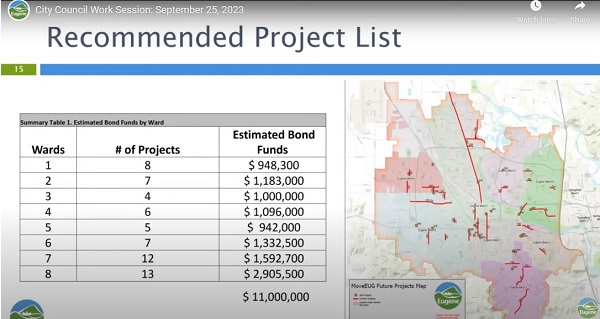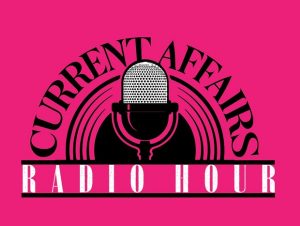With $15 million for walking, biking, and tree projects, council discusses equity, equality
7 min read
As the city shares its first proposal for spending $15 million for walking, biking, and tree projects, Eugene’s city council discusses the difference between equity and equality. On Sept. 25:
[00:00:13] Reed Dunbar (City transportation planning): In your packet was Council Resolution Number 5364. And it itemized a couple different funding buckets for the $15 million worth of projects: $5 million for walking, $3 million for biking, $3 million for safety, street trees is $2 million, and then there was $2 million which was to be unprogrammed and set aside to leverage grant funding and to achieve economies of scale on some of our larger projects…
[00:00:41] $2 million for trees and another $2 million that’s unprogrammed, so that leaves us with about $11 million of discrete project names that we wanted to identify.
[00:00:50] We looked at each of the different wards, and to make sure that we had about $1 million of projects in each of those wards so we got pretty close to that in spending the $11 million dollars.
[00:01:02] John Q: Ward 8 will get almost $3 million of the $11 million in projects, which represents over 26 percent of the total.
[00:01:09] Reed Dunbar: And we’re aware that Ward 8 is a little higher and there’s a couple of reasons for that. One of them is the equity criteria that we use—(Ward 8) scored really well. The West Eugene industrial area is over there and there’s a lot of transportation need there, even if there aren’t folks living in that area. It’s also the Churchill neighborhood and part of Bethel. And so, there’s just a lot of transportation need there.
[00:01:29] And one of the things in our equity criteria is trying to balance where people have a lot of stuff and where there isn’t a lot of stuff. So that’s how that shakes out.
[00:01:40] Councilor Alan Zelenka: When we put together the street bonds, we had three tenets that made the basis of that. One was ‘Promises made, promises kept,’ so we’d have a list and that’s what we would do.
[00:01:53] And then we had a second tenet: We would make sure it was audited and we had that part done. And then the third tenet was rough equity so that everybody in the city benefited roughly equally.
[00:02:06] And I assume that since this was street bond monies, that that criteria would also apply for this group of projects as well. And I was surprised to see such inequity in this.
[00:02:19] I was quite surprised to see one ward at three times as much as the other wards in terms of numbers of projects and dollars spent. So that rough equity criteria just kind of disappeared. I’m wondering why you chose not to incorporate that and ignored that as a criteria in selecting these projects…
[00:02:40] It’s been absolutely clear for the last—how many road bonds have we done? Four? Every single one of them has had that criteria in it, and every single one of them has rough equity among the different wards, and this is a big departure from that. I’m puzzled by it. I didn’t understand why you did that.
[00:02:57] I don’t agree with it. This was a dramatic increase in the amount of project funding for bike/ped and transit. And I didn’t think we needed to be explicit when we increased it that much. It wasn’t the amount of money that in past that warranted that kind of attention, but now it is.
[00:03:16] I’m not sure I can support this, given that doesn’t comply with what I thought was original tenet that Councilor (Bonny) Bettman and I both put together, make sure that we had an equitable street bond funding that went across the city in terms of benefit…
[00:03:33] Political calculation on rough equity was based on voters… so if we have eight wards and we want to have benefit occur in all eight wards and be roughly equal so that each have an equal incentive to vote ‘Yes.’
[00:03:50] If you actually did it by vote, you’d probably see that the way that this gets distributed isn’t equal to the way that the money’s distributed, but that’s not why we did it. It was basically that there was supposed to be equity among the wards in terms of the political viability of road funds.
[00:04:08] So the more we get away from that, the less likely the people who vote ‘Yes’ for these things (which is South Eugene) are going to vote for it. And that’s a political calculation that I worry about in the near future.
[00:04:24] Councilor Jennifer Yeh: I think that when we asked for equity, what we meant is not equality, right? Not put three projects in every ward, but find the places where they’ve been historically underserved or have a greater need, and put extra effort into those communities. For me, that’s what equity means. And you did that, and I’m very supportive of these decisions.
[00:04:45] Councilor Randy Groves: And just to respond a little bit to Councilor Zelenka: Remember, this is just $15 million of the, what is it, $61 million for the total bond measure?
[00:04:53] And when the numbers first came out, if you’ll recall and I don’t know if you have the numbers with you, but I recall Ward 8 being less than just about every other ward over the full package. And so this is just a small piece of it. And if we’re going to talk about balance and equity, then we need to go back to the whole package.
[00:05:12] But, you know, I didn’t complain at the time because I felt that the professionals were making professional judgments, and I was really ready to ride with that. I have pointed out some streets that are in very bad repair and have some significant safety issues. A lot of this is going into the Bethel portion of Ward 8, so it is in Bethel.
[00:05:31] And it’s the path that you’re talking about in Roosevelt goes right by J H Baxter, and so that whole area has just been significantly underserved, underprotected, and dealing with a lot of harsh realities of life right now. So, I just ask that when we look at this, we take the total bond in mind and look at the total $61 million, not just piece out $15 million…
[00:05:57] And how do we factor in commercial industrial area that produces a lot of tax revenue for this community?
[00:06:03] Those roads wear out fast because they have heavy trucks on them. And that gets factored into these road repairs. And so, you know, you take a part of town that’s mostly bicycle traffic, it probably isn’t wearing out as fast. So at some point we need to take all these values and put them into: How do we keep our city going?
[00:06:23] Councilor Greg Evans: I concur with Councilor Yeh and Councilor Groves on this. I think that we have a significant disparity in terms of investments in underserved communities and particularly as we’re talking about streets and street trees and lighting and the other things. So my questions have more to do with: How do we combine this investment to increase lighting in areas where we are extremely dark in the community?
[00:06:54] A lot of the side streets and the residential streets have extremely poor lighting. And I can’t tell you how many times that I have traveled on the West Side and through my ward and through my neighborhood where I’m afraid that I’m going to hit somebody who is totally dressed in black and riding a bike at 10 o’clock at night.
[00:07:17] And part of it is, yeah, they’re dressed in black and they don’t have reflective gear on, and their bike’s not properly lighted, or whatever the case may be. But also there is a significant lack of light in those thoroughfares and those side streets that create a traffic hazard and a safety issue.
[00:07:41] Mayor Lucy Vinis: Yeah, thank you. Kind of a hard, tricky conversation, but I do think it’s also important to remember that equity and equality are not the same things (as Jennifer pointed out) and one of our priorities as a community is to make sure that we are addressing those underserved areas that have not received the same investment in the past.
[00:08:01] So, okay, I thank—manager, yes.
[00:08:07] City Manager Sarah Medary: I hate to dive into this, but I do feel like,you know, there was some language in the resolution that talks about geographic distribution and equity. But the walking / biking projects, the language specifically says the criteria includes geographic distribution throughout the community to ensure all areas of the city benefit from the bond proceeds, balanced with projects selected to increase the equity of infrastructure across the city.
[00:08:32] And I think that’s what we’re trying to say, is, we feel like we’ve done that. And if you go back over history, in time, and look at where we’ve made those infrastructure investments, it probably balances out over time, but I hear you that it feels different.
[00:08:49] John Q: Eugene city councilors discuss the difference between equality and equity. They are scheduled to take up the project list again on Oct. 23.





